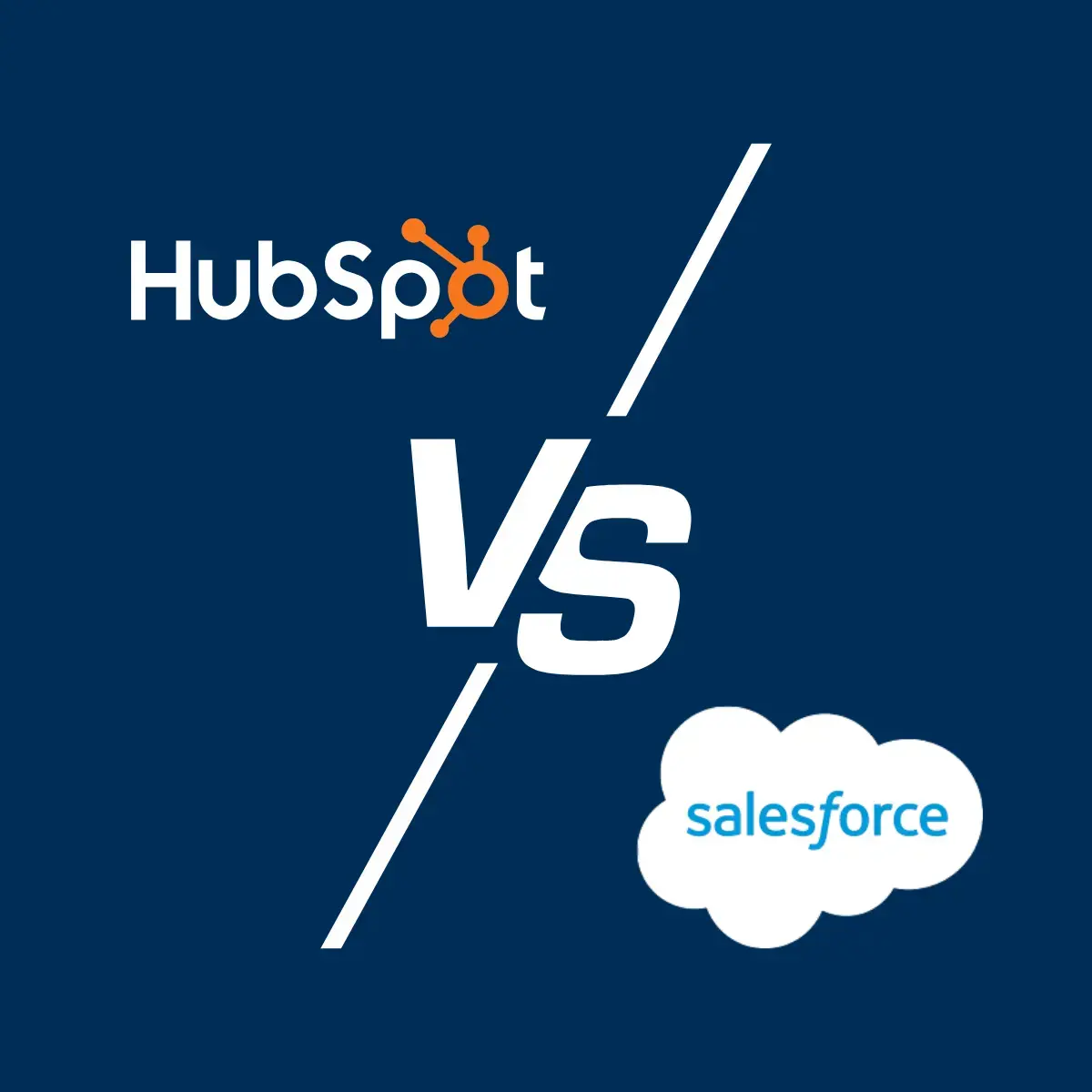HubSpot CRM vs Salesforce
A Comprehensive Comparison for Businesses
A Customer Relationship Management (CRM) system helps centralise contacts, track interactions, and streamline sales and marketing efforts. It’s no surprise that 73% of businesses use CRM software as of 2024. Here is a comparison of two of the most famous CRM
Comparison Area

-
Pricing
HubSpot offers a free plan with basic features and paid plans starting at $45/month, making it budget-friendly for small businesses. SalesForce starts at $25/user/month with no free plan, better suited for larger organisations needing advanced features.
-
Features and Ease of Use
HubSpot is great for inbound marketing, with tools for email and social media, and its interface is intuitive, ideal for beginners. SalesForce focuses on sales management with advanced analytics, but its complexity may require training, fitting larger teams.
-
Integrations, Scalability, and Support
Both integrate well with other tools, but SalesForce’s AppExchange is more extensive. SalesForce scales better for large enterprises, while HubSpot grows with SMBs. Customer support is robust for both, with SalesForce offering 24/7 options for higher plans.
Overview of HubSpot and Salesforce
-
In today’s competitive business landscape, choosing the right Customer Relationship Management (CRM) system is crucial for managing customer interactions, streamlining sales, and enhancing marketing efforts. Two leading platforms, HubSpot CRM and SalesForce, cater to different business needs, and this comparison aims to guide businesses in making an informed decision, with a slight lean towards HubSpot for its accessibility and user-friendliness, especially for small to medium-sized businesses (SMBs).
-
HubSpot
Launched in 2014 with a free CRM, HubSpot is known for its user-friendly interface and strong inbound marketing tools. It’s particularly popular among SMBs, offering affordability and scalability for growing businesses. As of recent data, it boasts over 56,500 customers, with a focus on ease of use and integrated marketing features.
-
SalesForce
A pioneer since 1999, SalesForce is a market leader with a 19.6% market share and over 150,000 customers. It’s designed for large enterprise-level companies, offering extensive customisation and advanced analytics, but it comes with a higher price tag and complexity.
-
This comparison will evaluate both platforms across six key criteria: pricing, features, ease of use, integrations, scalability, and customer support, ensuring a thorough analysis for businesses of all sizes.
Pricing
Comparison
Pricing is often a deciding factor, especially for SMBs with limited budgets.
-
HubSpot
Offers a free plan with basic contact management, email scheduling, and deal pipeline tracking, supporting up to 2,500 users. Paid plans start at $45 per month for the Starter plan, which includes sales, marketing, and service tools. Higher tiers, like Professional and Enterprise, offer advanced features at increased costs, with options for annual billing reducing the monthly rate to $15 for Starter. This affordability makes it ideal for startups and small businesses.
-
Salesforce
Does not offer a free plan. The Starter Suite begins at $25 per user per month, providing essential sales features. More comprehensive plans like Professional, Enterprise, and Unlimited range from higher costs, with prices scaling based on users and add-ons, potentially reaching $330/user/month for enterprise-level plans. This pricing structure is better suited for larger organisations with deeper pockets.
Winner
HubSpot, for its cost-effectiveness and free plan, making it accessible for businesses just starting out.
Features
Comparison
Both platforms offer robust feature sets, but their focus differs, catering to different business priorities.
-
HubSpot
Excels in inbound marketing, with tools for email marketing, social media management, content creation, and analytics. Its sales features include contact management, deal tracking, and automation, with AI-powered tools like conversation intelligence and predictive lead scoring enhancing efficiency. It’s designed to attract and nurture leads, making it a well-rounded choice for marketing-driven businesses.
-
Salesforce
Focuses on sales management, offering lead assignment, opportunity tracking, sales forecasting, and customer service tools. It includes advanced analytics, workflow automation, and AI features like Einstein for deeper insights. Its comprehensive nature is ideal for complex sales processes and large teams.
Winner
It’s a tie, as both platforms offer strong features, with HubSpot shining in marketing and Salesforce in sales management. The choice depends on whether your business prioritises marketing (HubSpot) or sales (Salesforce)
Ease of Use
Comparison
User-friendliness is crucial, especially for teams without extensive technical expertise.
-
HubSpot
Known for its intuitive interface, HubSpot is easy to navigate, with a clean design and minimal learning curve. It’s praised for its smart defaults and customisation options, making it accessible for beginners. This ease of use is a significant advantage for SMBs looking to adopt a CRM quickly.
-
Salesforce
Has a more complex interface, often described as clunky and outdated compared to competitors. It requires training and can be daunting for new users, with setup and configuration potentially time-consuming. This complexity is better suited for larger teams with dedicated IT support.
Winner
HubSpot, for its simplicity and user-friendly design, makes it easier for teams to adopt without extensive training
Integrations
Comparison
Integrations ensure the CRM can work seamlessly with other business tools, enhancing workflow efficiency.
-
HubSpot
Offers over 500 integrations through its App Marketplace, including Google Workspace, Microsoft 365, and Slack, facilitating a unified workflow. Its integration capabilities are robust, especially for marketing and sales tools.
-
Salesforce
Boasts an extensive AppExchange with over 1,300 sales apps and 1,000 deployment partners, offering unparalleled customization and integration options. This makes it ideal for businesses needing to connect with a wide range of enterprise-level tools.
Winner
Salesforce, for its larger and more extensive ecosystem of integrations, catering to complex business needs.
Scalability
Comparison
Scalability ensures the CRM can grow with the business, accommodating increasing complexity and user numbers.
-
HubSpot
Suitable for small to medium businesses, with scalability for growing organisations. It allows dynamic, non-linear headcount growth, meaning you can meet needs without linear scaling of engineering teams. However, it may not fully meet the needs of very large enterprises with complex requirements.
-
Salesforce
Designed for large enterprise-level companies, with advanced features and scalability options. It supports consistent team growth as companies scale, reflecting strategic alignment amid rising complexities. This makes it ideal for businesses planning significant expansion.
Winner
Salesforce, for its ability to handle large-scale operations and complex business needs, though HubSpot is scalable for SMBs.
Customer Support
Comparison
Effective customer support is vital for resolving issues and ensuring smooth operation.
-
HubSpot
Offers support through email, chat, and phone, with a comprehensive knowledge base, community forums, and HubSpot Academy for video tutorials. This support is included in all plans, making it accessible for all users.
-
Salesforce
Provides multiple support tiers, with higher-tier plans offering 24/7 phone support, enhanced packages, and access to thousands of consultants via AppExchange. This is particularly beneficial for large enterprises needing constant support.
Winner
Both offer strong support, but Salesforce’s higher-tier plans provide more comprehensive options, giving it a slight edge for larger businesses.
Final Thoughts
-
When choosing between HubSpot and Salesforce, consider your business size, budget, and priorities. For small to medium businesses seeking affordability, ease of use, and strong marketing tools, HubSpot is the preferred choice, with its free plan and intuitive interface making it accessible for startups and growing companies. For large enterprise-level organisations needing advanced sales management, extensive integrations, and scalability, Salesforce is better suited, despite its higher cost and complexity.
-
Ultimately, the decision should align with your business objectives, and testing free trials or demos can help determine the best fit for your team. This comparison, with a slight favour towards HubSpot for its accessibility, aims to guide businesses in selecting the CRM that will drive growth and efficiency.
.webp)

5+
Years of Industry Experience
150+
Projects Completed
98%
Positive Reviews
40+
Trusted Partners
Hubxpert's Role as a Platinum Partner
Looking to get HubSpot at the best possible price? As a HubSpot Platinum Partner, Hubxpert can offer exclusive discounts on HubSpot’s base pricing—helping you save while scaling smarter. Plus, we don’t just set you up; we train your team to ensure you get the most out of HubSpot’s powerful tools. From onboarding to optimisation, we make HubSpot easier, more affordable, and more effective for your business!
